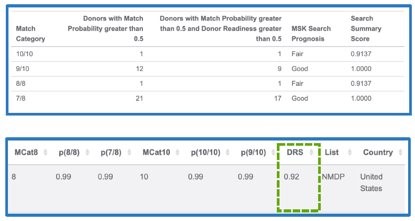Presented at the 2022 Tandem Meetings of the American Society of Transplantation and Cellular Therapy (ASTCT) and the CIBMTR® (Center for International Blood and Marrow Transplant Research®), researchers evaluated a new Search Summary Score (SSS) tool to provide rapid assessment of donor search productivity, showcasing its ability to streamline the search process for hematopoietic stem cell transplantation (HCT). This tool allows clinical teams to focus their search strategies on the most likely available donor sources, particularly for racially and ethnically diverse patients and others less likely to have an HLA fully matched donor.
Not all patients in need of unrelated donor allogeneic HCT will have a fully (8/8) matched donor available. The likelihood of a match varies substantially based on a patient’s racial or ethnic background. For example, Black and African American patients have only a 29% chance of finding an 8/8 matched, available donor on the Be The Match Registry®. Recent observational studies and clinical trials have highlighted the safe and effective use of HLA-mismatched unrelated donors (MMUD) in the setting of post-transplant cyclophosphamide and other novel graft-versus-host disease prevention strategies that allow for expanded donor choice and optimization of other donor selection characteristics, including donor age. Tools to rapidly assess unrelated donor search productivity can help guide clinical decision making by identifying those patients with a low likelihood of finding an 8/8 match and directing search efforts to mismatched donor sources. The SSS is one such tool.
For this work, the National Marrow Donor Program®/Be The Match® and CIBMTR study team created the SSS to serve as a rapid assessment tool for unrelated donor search productivity. This extends previous prognostic tools based on patient HLA frequency, including
Be The Match’s Search Prognosis (BTM-SP) and match probabilities in the donor list as defined by Memorial Sloan-Kettering’s Search Prognosis (MSK-SP) tool. The new SSS
score also uses the Donor Readiness Score (DRS), an individualized prediction of a specific donor’s availability to move forward to donation, alongside match predictions to provide the cumulative probability of the search resulting in an 8/8, 7/8,
10/10, or 9/10 HLA-matched available donor. The resulting score is a value ranging from 0 to 1.
The study team validated this new score by retrospectively analyzing the potential donor list of patients who went to transplant and comparing
the results to the SSS prediction. The SSS showed improved accuracy at both x/10 (0.974 compared to 0.851 with the BTM-SP) and x/8 (0.983 compared to 0.921 with the MSK-SP) matching levels using area under the curve as a measure of prediction accuracy,
measured on a scale of 0 to 1 (1 representing 100% accuracy).
In a retrospective validation process, the study team found 105 cases common to both BTM-SP and MSK-SP measures where they estimated ‘Good’ or ‘Very Good’ chances of finding an
8/8 donor, but the patient was instead transplanted with a 7/8 donor. In 63% of these cases, the SSS was correct at identifying the need for a less than full match. In cases of difficult searches, the improved accuracy of the SSS tool may encourage
physicians to pursue multiple treatment options simultaneously to ensure there are no unnecessary delays, especially since timing can be critical to patient outcomes. The below figure shows how adding the DRS into the SSS tool changed what would be
considered a ‘Fair’ search by MSK to a high likelihood of finding a fully matched donor.
Researchers concluded that the SSS tool provides a rapid and more accurate assessment of donor search productivity than other tools, allowing clinical teams to focus their search strategy on the most likely available stem cell sources. This data can help guide transplant centers and donor centers should there be future crises or instances when donors’ allogeneic products need to be cryopreserved such as the COVID-19 pandemic. It is expected that this measure will be especially helpful in more accurately assessing a search with more limited availability, commonly seen in racially and ethnically diverse patients. Setting these expectations correctly will allow us to better serve these populations.
Impact of Adding the Donor Readiness Score to the SSS Tool

